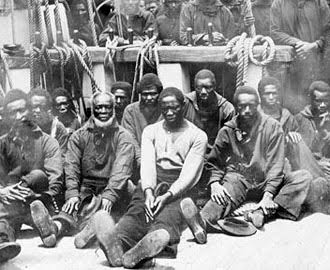Bayelsa Govt lauds Senate over resolution to upgrade Akassa Slave trade centre to national museum
The Senior Special Assistant (SSA) to Bayelsa State Governor on Tourism, Mr. Piriye Kiyaramo has lauded the Senate of the Federal Republic of Nigeria over its resolution to upgrade the Akassa Slave Trade Centre, located in Brass local government area of Bayelsa State to the status of National Heritage Slave Museum.

Mr. Kiyaramo who made the commendation when he received a representative of the Regent of Akassa Kingdom, Chief Joshua Nicholas and Madam Irene Digitemie in his office in Yenagoa on Friday, thanked the Senator, representing Bayelsa East Senatorial District, Chief Biobarakuma Degi-Eremienyo who moved the motion, entitled, “The need to establish National Museum at the Akassa Slave Trade Centre in Bayelsa State to preserve it as National Heritage.”
According to the governor’s aide, the resolution of the Senate was in line with the Senator Douye Diri led-prosperity administration, which has placed very high premium on the tourism sector, saying that the recent passage of the bill on the establishment of the International Polytechnic of Tourism and Technology by the Bayelsa State House of Assembly, was a clear indication of the new direction of the governor towards harnessing the tourism potentials of the state.
Mr. Kiyaramo noted that for centuries, museums have continued to play integral roles in preserving history in society, reiterating that, “artifacts, preserved in museums tell us stories about how our nation, communities and cultures came to be, and that without them, those stories could be easily forgotten”.
The Senior Special Assistant stated that the upgrading of Akassa Slave Trade Centre to a National Slave Museum will tell the story of the transatlantic slave trade better, adding that museums boasts of historical materials and information that enrich and create memorable experiences while serving our communities in multitude of ways, including inspiring and educating the younger generation.
Mr Kiyaramo also stressed the urgent need to introduce excursions and other outdoor extra curricular activities in our schools, pointing out that, stepping outside of the classroom to further expand on students’ knowledge was crucial to developing our younger generation, saying that, “it is possible for students on excursion visit to leave a museum better inspired to become future scientists, better leaders, musicians, or good writers.
He said the Akassa National Heritage Slave Museum will attract more visitors to the area, create jobs as well as attract investment to the state, which means more money will be injected into the local economy as small and medium size tourism enterprises will thrive at the destination.
Mr Kiyaramo, popularly known as Mr. Tourism, said tourism helps to enhance employment opportunities and earnings, which will bring economic benefits to the local population, pointing out that, in terms of employment, the local community could expand their earnings and socio-economic conditions, leading to improved standard of living.
Earlier the representative of the Regent of Akassa Kingdom, Chief Joshua Nicholas who also doubles as Ijaw National Congress (INC) Secretary of Akassa Clan, said the visit was to explore areas of collaboration with the state government on how best preserve the several historical artifacts in Akassa Clan, including underwater cultural heritage in form shipwrecks, among others.
Also speaking, Madam Irene Digitemie who was part of the delegation, thanked Senator Biobarakuma Degi-Eremienyo for drawing the attention of Senate to the Akassa Slave Trade Centre through his motion on the floor of the Red Chambers and the subsequent resolution of the Senate, urging the National Commission for Museum and Monuments to recognise the slave trade as a National Museum.
Recall that the Senate of the Federal Republic of Nigeria during its sitting on Wednesday, April 2022, passed a motion, urging the National Commission for Museum and Monuments to upgrade the Akassa Slave Trade Centre in Bayelsa State to a National Museum.
The transatlantic slave trade began during the 15th century, when Portugal, and subsequently other European kingdoms, were finally able to expand overseas to reach Africa. The Portuguese first began to kidnap people from the west coast of Africa and to take those they enslaved back to Europe.


